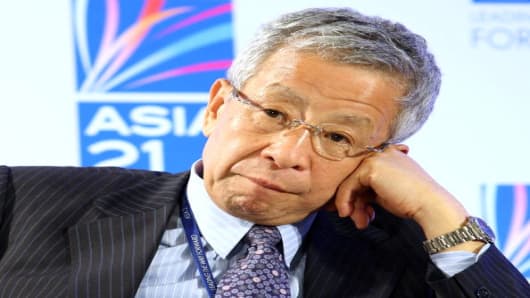"Abenomics" will not be able to achieve the two percent inflation target in Japan, Eisuke Sakakibara, former vice finance minister of Japan told CNBC on Friday, referring to Prime Minister Shinzo Abe's combination of ultra-loose monetary policy and fiscal stimulus.
"In terms of two percent inflation, it ['Abenomics'] will fail. Deflation is structural. Even at the time, when Japan was in the upward [growth] swing between 2002 and 2007, prices went down. It will be extremely difficult to get out of deflation," said Sakakibara, also known as "Mr. Yen" for his efforts to influence the currency's exchange rate through verbal and official intervention in the forex markets in the late 1990s.
Following significant pressure from Abe for bolder action, the Bank of Japan in January doubled its inflation target to 2 percent and made an open-ended commitment to buy assets from 2014. The central bank's new governor Haruhiko Kuroda, who won parliament's approval on Friday, has vowed to do "whatever it takes" to achieve the inflation goal in two years.
(Read More: Japan Parliament Approves Kuroda as BOJ Governor)
But according to Sakakibara structural deflation in the world's third largest economy is largely a result of the integration between the Japanese and Chinese economies and hence near impossible to move away from.
"Cheap Chinese goods come into Japan and push down the prices. And a lot of Japanese companies go to China to manufacture goods — so it's not going to change," said Sakakibara, who is currently a professor at Aoyama-Gakuin University in Tokyo.
Sakakibara, however, is more positive on the prospects for Abe's policies to lift growth in the economy.
"We may able to get something like a 2 to 2.5 percent growth rate in real GDP [gross domestic product], this would be the year of recovery," he added. The economy expanded 0.2 percent in the final three months of 2012, after contracting for two consecutive quarters from April through September.
Yen Warning
Sakakibara sounded a word of caution on continued depreciation in the yen — which has weakened almost 11 percent against the U.S. dollar since the start of the year.
He noted that if dollar-yen breaks 100, the next stop for the currency pair could be 130, adding that this would be "risky" for the Japanese economy.
"I remember in 1998, 1999 — it [dollar-yen] did go to 150 — I was at that time in the government, I was terrified," he said.
(Read More: Is the Yen Going Into a Free-Fall?)
Weakness in the yen is a doubled edged sword for the economy, while it boosts the competitiveness of Japanese exporters, it also increases the cost of the country's fuel imports. Japan's dependence on fuel imports has increased after the Fukushima nuclear disaster in March 2011, which led to the closure of most of the country's reactors.
According to Sakakibara, dollar-yen between 90 and 95 would be most favorable for the economy. Dollar-yen was trading around 96 on Friday.
—By CNBC's Ansuya Harjani



